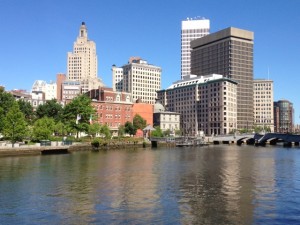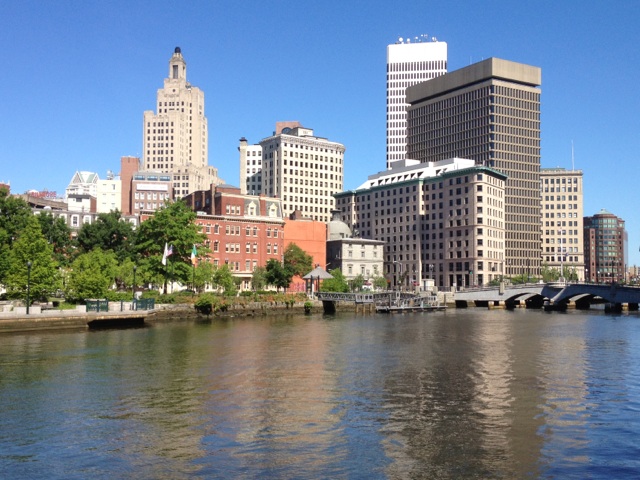 Earlier this month, the Rhode Island Foundation held a big conference that said it was intended to generate ideas for moving the state’s economy forward. Yesterday, I received a note about the “New Leaders,” a group purportedly about bringing new ideas to the management of our state. (This is apparently a different group from the “New Leaders Council” though it’s hard to tell from the rhetoric.) The Rhode Island Public Expenditure Council put out a report last week about its new ideas for reforming the state’s economic development apparatus. All these new ideas! Sounds great, no? Well, in a word, no.
Earlier this month, the Rhode Island Foundation held a big conference that said it was intended to generate ideas for moving the state’s economy forward. Yesterday, I received a note about the “New Leaders,” a group purportedly about bringing new ideas to the management of our state. (This is apparently a different group from the “New Leaders Council” though it’s hard to tell from the rhetoric.) The Rhode Island Public Expenditure Council put out a report last week about its new ideas for reforming the state’s economic development apparatus. All these new ideas! Sounds great, no? Well, in a word, no.
Wht’s the problem with new ideas, you might ask? Isn’t our poor state in dire need of some?
Well, yes and no. There are a million ways to change the way government does business, and hundreds of thousands of them would make our state a better and more prosperous society. But of those million ideas, there are only a paltry few that won’t gore someone’s ox when transformed into actual policy changes.
Now I think there are plenty of oxen out there that we would do well to gore, repeatedly. For example, I happen to think that the state and all its cities and towns pay too much for the financial services they need and that there are plenty of more economical ways to get those services that would benefit our state’s economy, too. But there are bond counsels, investment advisers, bankers, and tax credit brokers out there who would likely disagree with me, some strenuously.
Or we could stand to tax the wealthy of our state a little bit more. These “job creators” have created precious few jobs in exchange for the hundreds of millions of dollars of tax breaks we’ve awarded them over the past 15 years. Or perhaps we could look into ways to discourage the kinds of suburban development that cost so much to service, or at least make the developers pay the true costs to our communities. Or how about just guaranteeing that children in our poor cities have the same opportunities in their public schools as the children in the rich suburbs? That’s not a new idea, but it’s a good one.
There are plenty more ideas like this, but rather a lot of them have the disadvantage of inconveniencing some folks at the top of the heap: bankers, lawyers, real estate developers, rich people.
Many of those same people have their own list of ideas, many entries in which are different from mine. They routinely present them in anodyne language, calling them “tools” for example, or “innovations,” or “new ideas.” Unfortunately, they are often the same old oppression and exploitation, with a different label.
For example, you routinely hear that cities and towns need “tools” to control their costs. Well, yes, in a world where those cities and towns aren’t getting the state support they need to pay for state-required services, they obviously need to be relieved of the requirements or given more money. The Assembly’s refusal to face that choice honestly has already led to one bankrupt city and will likely lead to more before long. But the “tools” in this case are not as morally neutral as the word would suggest. Most of the components — cutting pay, cutting pensions, cutting jobs — are just ways to turn decent jobs into poor ones, and to lower the level of services we get. But calling the proposals “taking away pay and benefits from workers especially those in the poor cities” or “paying teachers less” doesn’t sell as well as “tools.” Admitting that these “tools” will exacerbate the difference of opportunity in our schools, putting the kids in the poor districts even farther behind the kids in the wealthy districts just isn’t as pleasant as looking at the nice effect the tools would have on budget numbers.
The sad truth is that the best ideas are likely to provoke conflict. Many good ideas already have. Rhode Island is not stuck in economic neutral because of a dearth of ideas. We are awash in good ideas, but people with power find many of them too threatening to consider seriously. Good ideas are not only worth fighting for, they usually require fighting for.
The title above is a bit of a joke; new ideas should always be welcome. We learn and improve our world by seriously considering them. But though it’s important to foster a climate where good new ideas are developed and can get a hearing, they are absolutely not the way forward for our economy.
What is? The first step to overcome our economic malaise is not to come up with new ideas, but to insist that the old ones be evaluated honestly. Did tax cuts actually create new jobs? Did developing all our open space make us more prosperous? Did cutting education really help our economy? Did ending welfare relieve pressures on the state budget? Did cutting state aid to cities and towns actually cut overall taxes?
Straight and honest answers to these policy questions will be worth a million new ideas. Unfortunately for all of us, House leaders seem to be committed to never considering the merits of their tax policies, and Senate leaders seem committed to never considering the merits of their policies about local funding and property taxes. Few suburban town councils in the state seem willing to push back against developers seeking to build on whatever open space is left. Fear of admitting error drives our leaders harder than intellectual honesty.
Until we have leaders willing honestly to confront questions raised by policy — especially policies they championed — and consider their implications with an open mind, all the new ideas in the world won’t help us one bit.






